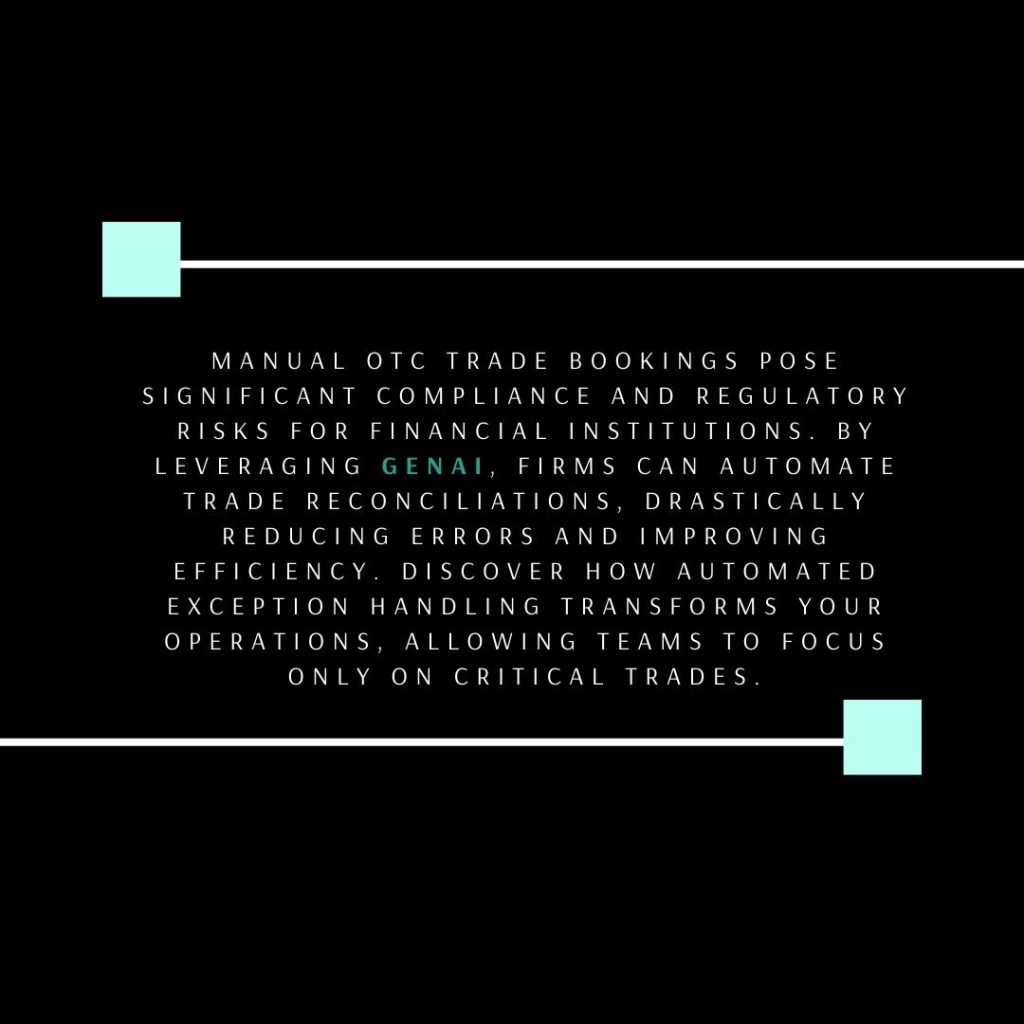Large financial institutions rely heavily on their market and treasury functions to hedge exposures and facilitate client trades. Over-the-counter (OTC) markets play a crucial role in these activities, where manual trade bookings are often necessary due to the nature of voice trades. Although essential, these manual bookings expose firms to several compliance and regulatory risks.
The Complexities of OTC Trade Operations
Middle and back-office operations that handle OTC trades can vary significantly between firms. However, a commonality across the board is the inherent risk of manual trade bookings. Financial institutions must ensure that every trade meets specific criteria for accuracy—such as execution timestamps, trade details, and counterparty information. Any deviation or delay in this process can lead to regulatory issues, financial penalties, and operational inefficiencies.

GenAI is reshaping finance and banking – don’t get left behind. Our exclusive newsletter delivers insights you simply can’t afford to ignore. Subscribe HERE.
Regulatory and Compliance Challenges
Voice trades, while essential for certain market functions, present unique challenges when it comes to compliance. Manual processes are vulnerable to human error, leading to potential inaccuracies in trade data. Regulatory bodies require firms to follow stringent rules regarding trade recording, making compliance a critical aspect of daily operations. Failing to comply with these regulations can result in costly fines and reputational damage.
The Limits of Manual Reconciliation
As the volume of voice trades increases, manual reconciliation becomes not only time-consuming but also highly error-prone. Teams responsible for trade bookings often spend hours reconciling data, which leads to inefficiencies. In fast-moving markets, the delay in processing these trades can impact the organization’s ability to make timely decisions, exposing them to further risks.
The Role of GenAI in Automating Trade Reconciliation
GenAI (Generative AI) offers a game-changing solution for automating the reconciliation process of voice trades. By analysing Bloomberg trader conversations and execution logs, GenAI can extract key details such as trade amounts, timestamps, and counterparty information in minutes. This automated extraction ensures accurate and fast reconciliation with booking system data, minimizing human error.
Exception Handling Made Simple
One of the most significant benefits of using GenAI is its ability to reduce the volume of manual reconciliations. Instead of manually processing every single trade, GenAI can generate exception reports, allowing staff to focus only on the trades that need further attention. This streamlined process not only reduces the time spent on trade reconciliation but also mitigates the risk of errors slipping through the cracks.
Case Study: Improving Efficiency and Reducing Risk
At Finaumate, we have successfully implemented GenAI-powered reconciliation solutions for our clients, significantly reducing their operational risks. Our approach has enabled these institutions to process large volumes of voice trades with minimal manual intervention, improving overall efficiency and compliance. By automating most of the reconciliation, our clients now handle only a small fraction of the trades flagged as exceptions, reducing their daily workload.
Transforming Trade Bookings with GenAI
As financial institutions continue to face increasing pressure to comply with regulatory requirements, automating manual processes becomes a critical step in reducing operational risks. GenAI offers an innovative approach to streamline OTC trade bookings, providing faster, more accurate reconciliation processes. By implementing these technologies, firms can reduce costs, improve efficiency, and ensure compliance with regulatory standards.
Interested in learning how GenAI can transform your trade booking processes? Contact us today for a free consultation and see how we can help you reduce risks and improve efficiency.






